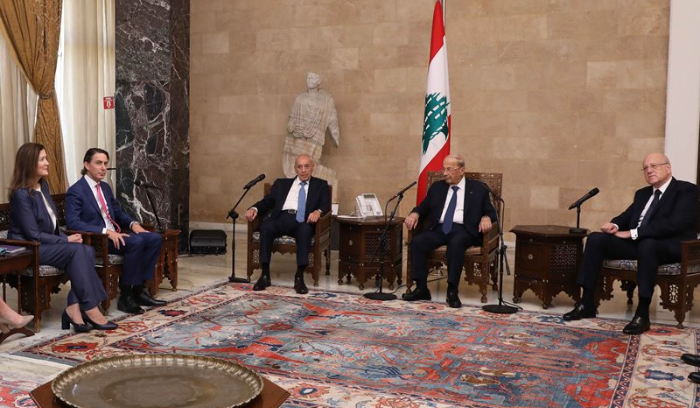
by english.aawsat.com — The US mediator arbitrating negotiations of the maritime border between Lebanon and Israel, Amos Hochstein, reported “very good progress” towards arranging for a deal that benefits the Lebanese economy. Hochstein’s optimism followed his meetings with several Lebanese officials in Beirut. Many in Lebanon remain “cautious” as the results of talks suggest a delay in time before completing a deal, a matter which adds to rising tensions considering threats made by Hezbollah. Lebanon and Israel are engaged in US-brokered negotiations to demarcate maritime borders, which would help define each party’s share of oil and gas resources and pave the way for further exploration. Hochstein arrived in Beirut on Friday.
The US mediator held rounds of talks with senior officials, and met with President Michel Aoun, Parliament Speaker Nabih Berri, Caretaker Prime Minister Najib Mikati, in addition to Deputy Speaker of Parliament Elias Bou Saab, Minister of Foreign Affairs Abdullah Bou Habib and Director of General Security, Major General Abbas Ibrahim. Hochstein updated Lebanese officials on his contacts during the past weeks following a prior visit to Beirut. Besides discussing his contacts with the Israeli side, Hochstein also reviewed the results of his visit to France, including talks with the French energy company “Total,” which is in charge of drilling in Lebanese territorial waters, accompanying sources told Asharq Al-Awsat. Sources said that the US mediator “did not carry a decisive Israeli response to Lebanese demands,” stressing that the delay in reaching an agreement, “is something that does not satisfy the Lebanese who insist on achieving it as soon as possible.” Moreover, Lebanon categorically rejects establishing joint fields with Israel.
Hochstein, after concluding his trip to Lebanon, travelled to Doha, sources revealed. Lebanon and Israel, formally at war since 1948, have no diplomatic ties and are negotiating over an area measuring more than 860 square kilometers of the Mediterranean Sea that is believed to contain significant offshore gas reserves. Both countries have made claims to the territory.



